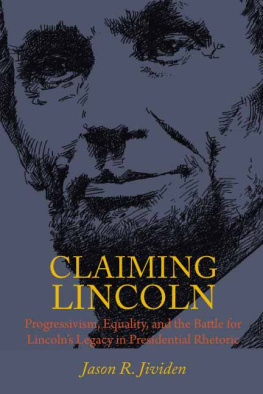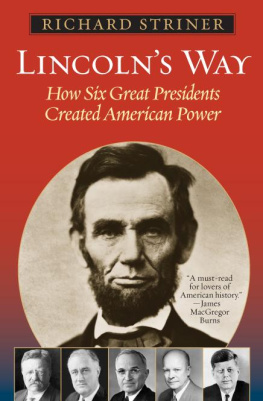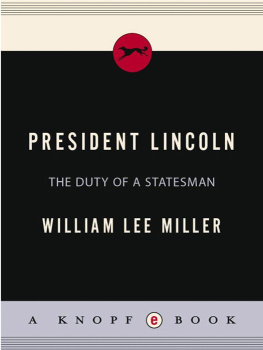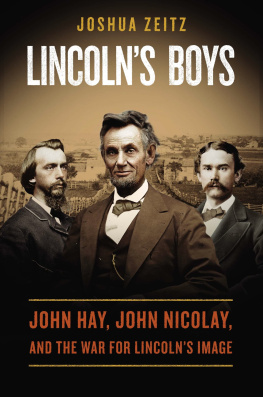2011 by Northern Illinois University Press
Published by the Northern Illinois University Press, DeKalb, Illinois 60115
Manufactured in the United States using postconsumer-recycled, acid-free paper.
All Rights Reserved
Design by Shaun Allshouse
Library of Congress Cataloging-in-Publication Data
Jividen, Jason R.
Claiming Lincoln: progressivism, equality, and the battle for Lincolns legacy in
Presidential rhetoric / Jason R. Jividen.
p. cm.
Includes bibliographical references and index.
ISBN 978-0-87580-435-4 (clothbound : alk. paper)
1. PresidentsUnited StatesHistory. 2. PresidentsUnited StatesLanguage
History. 3. RhetoricPolitical aspectsUnited StatesHistory. 4. Political oratoryUnited StatesHistory. 5. Lincoln, Abraham, 18091865Influence. 6. Progressivism (United States politics) I. Title.
E176.J58 2011
352.2390973dc22
2010037739
Contents
Acknowledgments
Introduction
1Lincoln and the Idea of Equality
2Theodore Roosevelts Lincoln
3Woodrow Wilsons Lincoln
4Franklin Roosevelts Lincoln
5Lyndon Johnsons Lincoln
6Barack Obamas Lincoln
Conclusion
Notes
Bibliography
Index
To Wesley and Rebecca
Acknowledgments
This book would not have been possible without the efforts of my teachers. For his direction and support, I owe much gratitude to Professor Larry Arnhart. Thanks are also due to Professors Gary Glenn, Christine Dunn Henderson, and Gregory Schmidt for their guidance and inspiration during the writing of this book and beyond. I would like to acknowledge the efforts of the late Professor Morton Frisch, who remains an inspiration as a teacher, a scholar, a citizen, and a human being.
This project began while I was in the political science doctoral program at Northern Illinois University. During that time, I was fortunate to have the assistance of H. B. Earhart Fellowships, and I thank the Earhart Foundation for their generous support. For their support during the revisions of the manuscript, I am also especially grateful to Gary Quinlivan, Bradley C.S. Watson, and my colleagues at the Center for Political and Economic Thought at Saint Vincent College. Many thanks are due also to Sara Hoerdeman and Susan Bean at Northern Illinois University Press for their invaluable advice and enthusiasm. I am grateful to the anonymous reviewers for their helpful suggestions, and I would also like to thank my former colleagues at the University of Saint Francis for their support during the editing of the manuscript. For their conversation and support over the years, I thank my friends from my graduate program at Northern Illinois University. For their advice, comments, and friendship while writing this book, I must particularly thank Steve McCarthy, Andy Schott, Chris Whidden, and Lauren Hall. Of course, any errors or deficiencies in this work remain my own.
Above all, I must express my deepest gratitude to my wife, Marcie. This book would not have been written without her unwavering support. Her love and patience continue to amaze me.
Introduction
Abraham Lincoln remains one of the most frequently mentioned figures in American political rhetoric, and we have witnessed Barack Obamas appeals to the Lincoln image during his recent campaign and in his early speeches as president. Beginning on the eve of the two-hundredth anniversary of Lincolns birth, Obamas appeals have created interest among scholars, politicians, and journalists who rush to affirm or debunk the presidents invocation of Lincolns legacy, yet this phenomenon is nothing new in American politics. American politicians attempts to appropriate the Lincoln image have often turned on an appeal to the American promise of equality, said to be proclaimed in the Declaration of Independence, vindicated in the Civil War and the Reconstruction Amendments, and developed through the Progressive Era, the New Deal, the Great Society, the civil rights movement, and beyond. Throughout, politicians have claimed to continue Lincolns unfinished work in the name of the American promise. Yet many who have invoked Lincolns name have profoundly misunderstood or misrepresented Lincolns political thought, particularly his understanding of equality.
In his widely influential Lincoln Reconsidered, prominent Lincoln scholar David Donald discussed the American political traditions attempt to get right with Lincoln. Donalds fundamental insight is that, as of the 1950s, the jury was still out on the question of Lincolns political thought and its influence upon the American political tradition. Until the beginning of the twentieth century, the claim to Lincolns political inheritance had predominantly been in the possession of the Republican Party. However, during the Progressive Era, the claim to the Lincoln inheritance became a partisan issue in the 1912 presidential election. William Howard Taft, Theodore Roosevelt, and Woodrow Wilson all publicly claimed to follow in the Lincolnian tradition. Likewise, in 1932, as part of their heated debate over what could and should be done to address the challenges of the Great Depression, Herbert Hoover and Franklin Roosevelt engaged in a similar disagreement about just who could plausibly claim to follow in Lincolns footsteps. The claim to the Lincoln inheritance had become a major component of presidential rhetoric. Given Obamas appeals to Lincoln in recent years, it appears this is still the case.
The dispute over Lincoln in political rhetoric would find a parallel in academia, wherein scholars often disagree, sometimes vehemently, about the nature and scope of Lincolns influence on American political development. One finds that sharp, sometimes bitter disagreements persist between serious and thoughtful people as to the character of Lincolns political thought. Central to these debates is the meaning and influence of Lincolns opinion, famously declared in his Gettysburg Address, that we are a nation dedicated to the proposition that all men are created equal. Many observers, both critical and supportive of Lincoln, suggest Lincoln was central in establishing a modern, leveling egalitarianism in American politics. This modern pursuit of equality is said to focus not upon securing the formal equality of individuals before the law or equality of opportunity but, rather, upon equalizing substantive outcomes among both individuals and groups. Generally this pursuit calls for the presence of a strong, centralized national government to pursue such ends. Its proponents often seek to alter or abolish fundamental constitutional structures and procedures (for example, various aspects of federalism, representation, separation of powers, among other institutions) thought to be antidemocratic or reactionary obstacles to the goal of greater equality in American society. However, in reality, Lincolns pursuit of equality was very different from the egalitarianism often espoused by modern-day academics and politicians, in both principle and practice. Arguing against the institution of slavery and defending the idea of free labor, Lincoln sought to secure individuals equal liberty to exercise diverse and necessarily unequal talents in pursuit of their interests, under the rule of law, while expecting an inequality of results or outcomes among individuals in that pursuit. Lincoln understood that this pursuit of equality is moderated by the limited government constitutionalism that follows from the premise that all men are equally endowed with natural and inalienable rights. Moreover, Lincoln understood that this pursuit must be tempered by a prudential appreciation for the circumstances of political practice.








